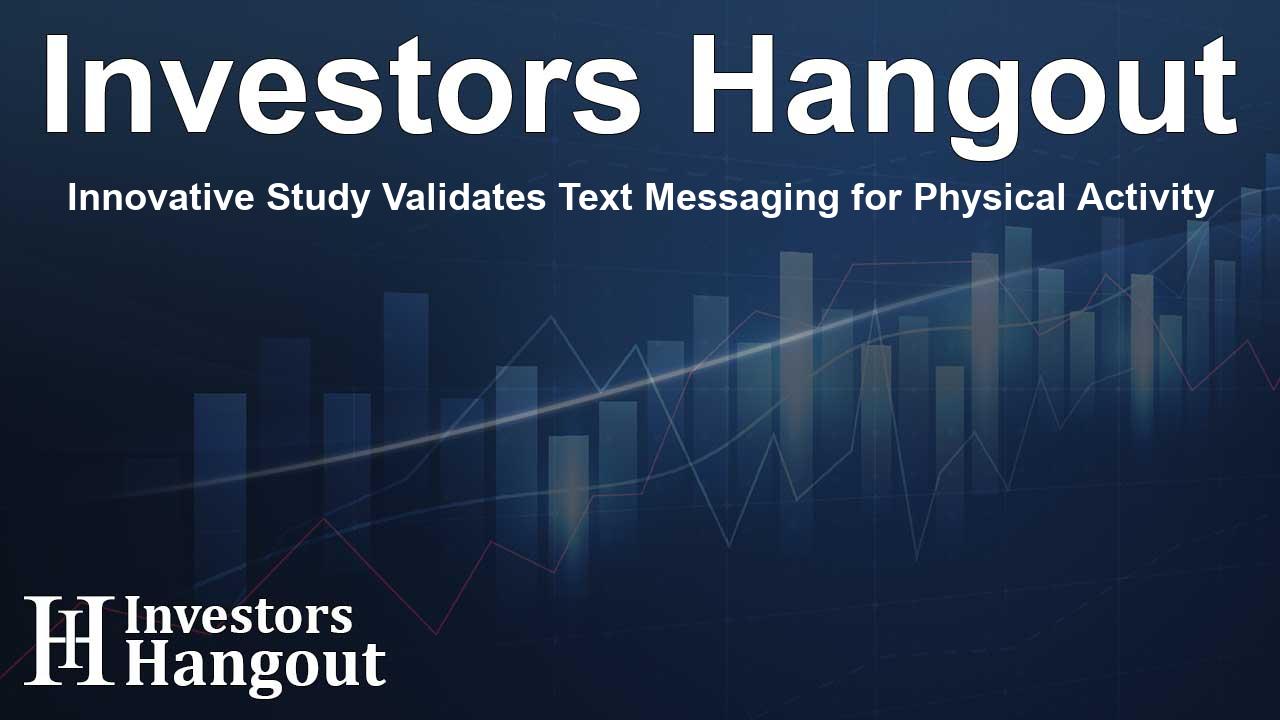Innovative Study Validates Text Messaging for Physical Activity

Groundbreaking Research on Text-Based Health Coaching
The latest research conducted by CareMessage brings exciting news about health coaching through digital platforms. This study has revealed that using text messaging can significantly boost physical activity among its users, demonstrating remarkable effectiveness similar to that of human health counselors.
Understanding the Impact of Digital Health Solutions
Text-based interventions can engage users more conveniently, making them a practical solution for many individuals who might struggle to access traditional healthcare services. This randomized clinical trial involved an innovative approach where 280 predominantly Latino adults participated in a program designed to enhance their physical activity through a user-friendly SMS system.
Key Findings from the Study
Throughout the 12-month program, participants who utilized the Short Message Service (SMS) provided by CareMessage showed an impressive increase in their weekly walking time, averaging an additional 113.6 minutes per week. In comparison, those who received traditional human telephone counseling increased their physical activity by 116.4 minutes, underscoring the equivalence between the two methods.
Both cohorts achieved significant results in maintaining physical activity levels, which remained consistent over the study period. Alongside these findings, participants reported positive changes in various health metrics, including better weight maintenance, reduced sedentary behavior, and improvements in overall well-being.
Expert Perspectives on the Study
Dr. Abby C. King, the lead author of the study, emphasized the importance of utilizing technology to enhance health outcomes for the broader population. According to her, digital health tools like the CareMessage platform can provide scalable solutions to address health challenges faced by various underserved communities.
The Role of CareMessage in Improving Patient Engagement
CareMessage has been at the forefront of establishing an extensive patient engagement platform targeting low-income populations throughout the nation. The organization has seen remarkable success since its inception, reaching millions of individuals with personalized health information and support through text messaging.
Enhancing Health Accessibility
The focus of the study on Latino adults highlights a crucial aspect of healthcare accessibility. Many interventions often lack cultural relevance, which can discourage participation. This research demonstrates that using a tailored text messaging approach can effectively bridge this gap, providing individuals with the necessary tools to improve their health.
Details of the Clinical Trial
The randomized trial was carefully crafted to measure the equivalence of both the SMS and human counseling interventions within a pre-established margin of activity improvement. The study achieved an impressive completion rate of 88.9%, affirming that participants were actively engaged and motivated throughout the process.
Utilizing validated assessment methods, the research confirmed the effectiveness of text-based health interventions. This method is particularly beneficial for older adults and other demographic groups that may face barriers to traditional healthcare support.
Public Health Significance
The implications of this study extend beyond individual benefits. The positive outcomes observed can serve as a framework for future public health initiatives aiming to promote preventive care and management of chronic diseases within underserved populations.
Conclusion: The Future of Digital Health Interventions
The publication of this research not only enhances our understanding of digital health tools but also positions them as a viable alternative to conventional counseling methods. The ability to deliver effective health support through text messaging represents a significant leap towards accessible healthcare for all.
As CareMessage continues to innovate and refine its platform, the potential for expanding reach and improving health outcomes grows exponentially, particularly among communities that need it the most.
Frequently Asked Questions
What is the main finding of the study?
The study found that text-based health coaching is as effective as human counseling for increasing physical activity among participants.
Who conducted the research?
The research was led by CareMessage in collaboration with Stanford University, with funding from a health institute.
How many participants were involved in the trial?
A total of 280 predominantly Latino adults participated in the trial.
What type of intervention was used?
The intervention consisted of a tailored SMS health coaching program delivered over a 12-month period.
Why is this research important?
This research is crucial as it highlights the potential of digital health tools to improve accessibility and health outcomes for underserved populations.
About The Author
Contact Kelly Martin privately here. Or send an email with ATTN: Kelly Martin as the subject to contact@investorshangout.com.
About Investors Hangout
Investors Hangout is a leading online stock forum for financial discussion and learning, offering a wide range of free tools and resources. It draws in traders of all levels, who exchange market knowledge, investigate trading tactics, and keep an eye on industry developments in real time. Featuring financial articles, stock message boards, quotes, charts, company profiles, and live news updates. Through cooperative learning and a wealth of informational resources, it helps users from novices creating their first portfolios to experts honing their techniques. Join Investors Hangout today: https://investorshangout.com/
The content of this article is based on factual, publicly available information and does not represent legal, financial, or investment advice. Investors Hangout does not offer financial advice, and the author is not a licensed financial advisor. Consult a qualified advisor before making any financial or investment decisions based on this article. This article should not be considered advice to purchase, sell, or hold any securities or other investments. If any of the material provided here is inaccurate, please contact us for corrections.
